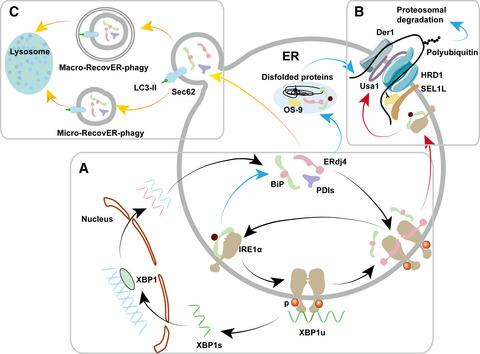当前位置:
X-MOL 学术
›
FEBS Lett.
›
论文详情
Our official English website, www.x-mol.net, welcomes your
feedback! (Note: you will need to create a separate account there.)
Negative feedback and modern anti‐cancer strategies targeting ER stress response
FEBS Letters ( IF 3.0 ) Pub Date : 2020-12-01 , DOI: 10.1002/1873-3468.14000 Yaofu Liu 1 , Zhenzhi Tan 1 , Yili Yang 1
FEBS Letters ( IF 3.0 ) Pub Date : 2020-12-01 , DOI: 10.1002/1873-3468.14000 Yaofu Liu 1 , Zhenzhi Tan 1 , Yili Yang 1
Affiliation

|
Endoplasmic reticulum (ER) stress is a cell state in which misfolded or unfolded proteins are aberrantly accumulated in the ER. ER stress induces an evolutionarily conserved adaptive response, named the ER stress response, that deploys a self‐regulated machinery to maintain cellular proteostasis. However, compared to its well‐established canonical activation mechanism, the negative feedback mechanisms regulating the ER stress response remain unclear and no accepted methods or markers have been established. Several studies have documented that both endogenous and exogenous insults can induce ER stress in cancer. Based on this evidence, small molecule inhibitors targeting ER stress response have been designed to kill cancer cells, with some of them showing excellent curative effects. Here, we review recent advances in our understanding of negative feedback of the ER stress response and compare the markers used to date. We also summarize therapeutic inhibitors targeting ER stress response and highlight the promises and challenges ahead.
中文翻译:

针对 ER 应激反应的负反馈和现代抗癌策略
内质网 (ER) 应激是一种细胞状态,其中错误折叠或未折叠的蛋白质异常积累在 ER 中。内质网应激诱导进化上保守的适应性反应,称为内质网应激反应,它部署自我调节机制来维持细胞蛋白质稳态。然而,与其完善的规范激活机制相比,调节内质网应激反应的负反馈机制仍不清楚,也没有建立公认的方法或标志物。几项研究表明,内源性和外源性损伤均可诱导癌症中的 ER 应激。基于这一证据,已经设计出靶向内质网应激反应的小分子抑制剂来杀死癌细胞,其中一些显示出优异的疗效。这里,我们回顾了我们对 ER 应激反应负反馈的理解的最新进展,并比较了迄今为止使用的标记。我们还总结了针对 ER 应激反应的治疗抑制剂,并强调了未来的前景和挑战。
更新日期:2020-12-01
中文翻译:

针对 ER 应激反应的负反馈和现代抗癌策略
内质网 (ER) 应激是一种细胞状态,其中错误折叠或未折叠的蛋白质异常积累在 ER 中。内质网应激诱导进化上保守的适应性反应,称为内质网应激反应,它部署自我调节机制来维持细胞蛋白质稳态。然而,与其完善的规范激活机制相比,调节内质网应激反应的负反馈机制仍不清楚,也没有建立公认的方法或标志物。几项研究表明,内源性和外源性损伤均可诱导癌症中的 ER 应激。基于这一证据,已经设计出靶向内质网应激反应的小分子抑制剂来杀死癌细胞,其中一些显示出优异的疗效。这里,我们回顾了我们对 ER 应激反应负反馈的理解的最新进展,并比较了迄今为止使用的标记。我们还总结了针对 ER 应激反应的治疗抑制剂,并强调了未来的前景和挑战。











































 京公网安备 11010802027423号
京公网安备 11010802027423号